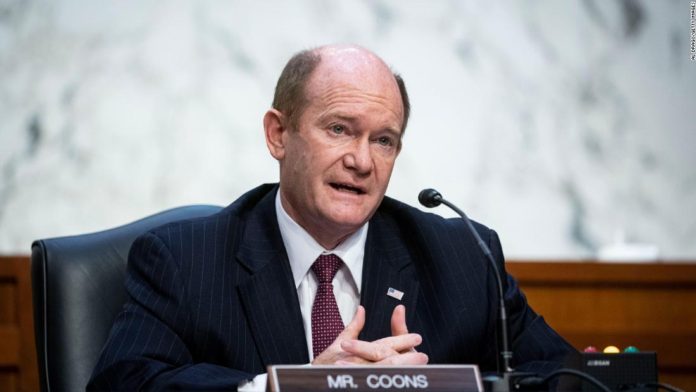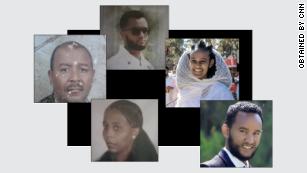Washington(CNN)President Joe Biden is dispatching one of his top congressional allies to Ethiopia to meet with Prime Minister Abiy Ahmed amid the humanitarian crisis in that country’s Tigray region.
Sen. Chris Coons “will convey President Biden’s grave concerns about the humanitarian crisis and human rights abuses in the Tigray region and the risk of broader instability in the Horn of Africa,” national security adviser Jake Sullivan said in a statement Thursday.
Coons “will also consult with the African Union on how to advance the region’s shared interests in peace and prosperity,” Sullivan said.
The Delaware Democrat’s trip to the Ethiopian capital of Addis Ababa comes after repeated calls by the Biden administration for unfettered humanitarian access and an independent investigation into the human rights abuses in the region. During a House Foreign Affairs Committee hearing last week, Secretary of State Antony Blinken for the first time said acts of “ethnic cleansing” had been committed in Western Tigray.
“The challenge in Ethiopia is very significant. And it’s one that we’re very, very focused on, particularly the situation in Tigray, where we are seeing very credible reports of human rights abuses and atrocities that are ongoing,” Blinken said.
On Thursday, the Biden administration announced “an additional nearly $52 million in assistance to respond to the humanitarian crisis in Ethiopia’s Tigray region.”
“This assistance from the American people will enable our international humanitarian partners to help some of the estimated 4.5 million people in need in Tigray and nearly 62,000 refugees who have fled to Sudan,” Blinken said in a statement.
In that statement, Blinken again called for the “cessation of hostilities, the immediate withdrawal of Eritrean forces, and an end to the Ethiopian government’s deployment of Amhara regional forces in Tigray” and “accountability for all those responsible for human rights abuses and atrocities, whether they be in the Ethiopian National Defense Forces, Tigray People’s Liberation Front forces, Eritrea Defense Forces, or Amhara regional forces.”
“We remain gravely concerned about the worsening humanitarian crisis in Tigray,” he said. “While we acknowledge public commitments and progress made by the Government of Ethiopia on increasing humanitarian access, the international community must see follow-through on all commitments, including lifting restrictions on the import and use of communications equipment by humanitarian organizations and providing extended visas for international humanitarian workers.”
Blinken has called for unfettered humanitarian access to the region and an independent investigation into the reported human rights abuses, which a State Department spokesperson previously noted included reports of “killings, sexual assault, looting, intentional displacement of civilians, and forced return of Eritrean refugees.”
A CNN report documented a November massacre at a religious festival last November, where a group of Eritrean soldiers opened fire on Maryam Dengelat church while hundreds of congregants were celebrating mass, according to eyewitnesses. That report, drawing on interviews with 12 eyewitnesses, more than 20 relatives of the survivors and photographic evidence, detailed a three day campaign of violence, with soldiers slaughtering local residents, displaced people and pilgrims.
The US Agency for International Development announced in early March that it was deploying a Disaster Assistance Response Team “to respond to growing humanitarian needs stemming from conflict in Ethiopia’s Tigray region.”
“After nearly four months of fighting between armed groups, hundreds of thousands have been forced to flee their homes and more than four million people are in need of food assistance,” a news release from the agency said. “USAID’s DART will lead the U.S. Government’s humanitarian response. The team includes disaster experts who are assessing the situation, identifying priority needs to scale up assistance, and working with partners to provide urgently needed assistance to communities affected by the conflict.”






